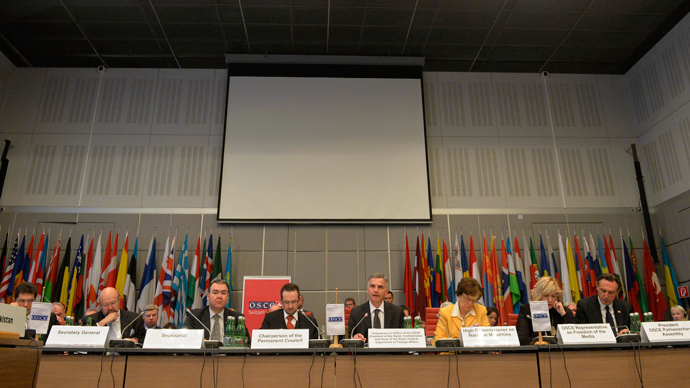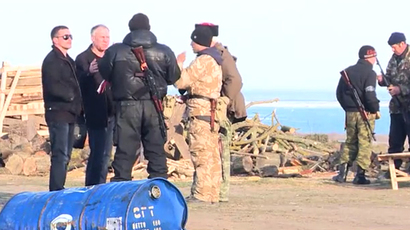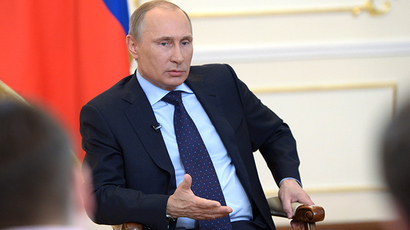OSCE military observer mission en route to Crimea

The Organization for Security and Co-operation in Europe (OSCE) is sending a delegation which includes 35 unarmed military personnel from 18 nations to observe the situation in Crimea amid tensions in Ukraine, according to an OSCE press release.
The decision to send an OSCE mission was discussed at a joint meeting of the Permanent Council and the Forum for Security Co-operation (FSC) in Vienna on March 4, 2014.
Earlier Ukraine requested OSCE participating states to send military representatives from March 5 to 12, 2014, starting in Odessa, according to the press release.
Eighteen OSCE member states have responded positively to the request of the crisis-torn country to send their representatives. Among them are Canada, the Czech Republic, Denmark, Estonia, Finland, France, Germany, Hungary, Ireland, Latvia, Lithuania, Norway, Poland, Slovakia, Sweden, Turkey, the United Kingdom, and the United States. One representative from the OSCE Conflict Prevention Centre will also be participating.
The mission will take place under Chapter III of the Vienna Document 2011 “which allows for voluntary hosting of visits to dispel concerns about unusual military activities,” according to a press release.
"It is my hope that this military visit will help to de-escalate tensions in Ukraine,” said OSCE Secretary General Lamberto Zannier. “By providing an objective assessment of the facts on the ground, the OSCE will be better placed to foster a political solution to the current crisis through dialogue," he added.
One of the delegation’s main focuses is to concentrate on the potential for a military conflict between Russia and Ukraine.
Baer also added that the military observer mission is a “broad-based monitoring effort” that will try to prevent a possible “military incursion” and encourage dialogue. The observers will keep an eye out for “areas where there has been tension or uncertainty has arisen over lack of clarity over military movements.”
The OSCE comprises Russia, the US, all European countries, and some central Asian nations. It is based on consensus, meaning that the majority of the monitoring missions need full approval by all nations – including OSCE member Russia.
OSCE officials were already in Ukraine on Tuesday and making their way to the Crimea, said Daniel Baer, the chief US delegate to the OSCE. The officials specialize in minority rights and freedom of the media.

RT news producer Lida Vasilevskaya reported on Tuesday evening that the OSCE delegation had arrived in Simferopol, Ukraine, but said they were not giving any comments to the media.
Tensions in Crimea became heated after the Ukrainian parliament voted to repeal a law which gave regional status to the Russian language. Authorities in Crimea requested Moscow’s assistance and Crimean authorities denounced the coup-imposed government in Kiev, declaring that all Ukrainian law enforcement and military deployed in the peninsula must take orders from them. The majority of troops in Crimea switched sides in favor of local authorities.
More than half of the Crimean population are ethnically Russian and use only the Russian language for their communication. The residents have announced they will hold a referendum on March 30 to determine the fate of the Ukrainian autonomous region.
Russian President Vladimir Putin clarified the country’s stance on Ukraine in an interview on Tuesday. He stated that Russia will not go to war with the people of Ukraine, but will use its troops to protect citizens if radicals with clout in Kiev try to use violence against Ukrainian civilians – particularly ethnic Russians.
Putin, who was given a mandate by the Russian Senate to send troops in order to protect the Russian-speaking population in Ukraine, said there is no need for such action yet.
Putin cited the actions of radical activists in Ukraine – including the chaining of a governor to a stage as public humiliation and the killing of a technician during an opposition siege of the Party of Regions headquarters – as justification for Russia to be concerned for the lives and well-being of people in eastern and southern Ukraine.
Incidents like those are why Russia reserves the option of troop deployment.
“If we see this lawlessness starting in eastern regions, if the people ask us for help – in addition to a plea from a legitimate president, which we already have – then we reserve the right to use all the means we possess to protect those citizens. And we consider it quite legitimate,” Putin said.
Russia’s representative to the UN, Vitaly Churkin, also said on Tuesday that the deal surrounding the Black Sea Fleet allows Russia to station a contingent of up to 25,000 troops in Ukraine.
According to the initial agreement, the Russian Black Sea Fleet was to stay in Crimea until 2017, but the deal was later prolonged for another 25 years.














